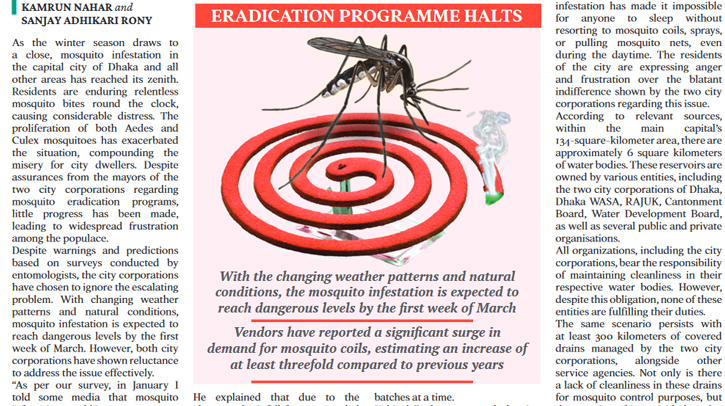
Photo : Messenger
As the winter season draws to a close, mosquito infestation in the capital city of Dhaka and all other areas has reached its zenith. Residents are enduring relentless mosquito bites round the clock, causing considerable distress. The proliferation of both Aedes and Culex mosquitoes has exacerbated the situation, compounding the misery for city dwellers. Despite assurances from the mayors of the two city corporations regarding mosquito eradication programs, little progress has been made, leading to widespread frustration among the populace.
Despite warnings and predictions based on surveys conducted by entomologists, the city corporations have chosen to ignore the escalating problem. With changing weather patterns and natural conditions, mosquito infestation is expected to reach dangerous levels by the first week of March. However, both city corporations have shown reluctance to address the issue effectively.
“As per our survey, in January I told some media that mosquito infestation would increase to a great extent in February and March. It has happened not only in Dhaka but also in the whole country. It will reach its peak in the first week of March,” Kabirul Bashar, an entomologist and professor at Jahangirnagar University, told The Daily Messenger.
He explained that due to the absence of rainfall for an extended period, organic pollutants in water, which are the major food for the Culex mosquito, have increased.
Besides, the escalating temperature due to the end of the winter season gives the mosquito a suitable weather for laying eggs. These eggs will develop into mosquitoes in batches at a time.
Kabirul Bashar suggested cleaning the drains, canals, and other water bodies, which are the breeding areas for Culex, and spraying larvicide.
In various areas of the capital, it has been observed that parents with small children or school-aged students are facing heightened challenges. The relentless mosquito infestation has made it impossible for anyone to sleep without resorting to mosquito coils, sprays, or pulling mosquito nets, even during the daytime. The residents of the city are expressing anger and frustration over the blatant indifference shown by the two city corporations regarding this issue.
According to relevant sources, within the main capital's 134-square-kilometer area, there are approximately 6 square kilometers of water bodies. These reservoirs are owned by various entities, including the two city corporations of Dhaka, Dhaka WASA, RAJUK, Cantonment Board, Water Development Board, as well as several public and private organisations.
All organizations, including the city corporations, bear the responsibility of maintaining cleanliness in their respective water bodies. However, despite this obligation, none of these entities are fulfilling their duties.
The same scenario persists with at least 300 kilometers of covered drains managed by the two city corporations, alongside other service agencies. Not only is there a lack of cleanliness in these drains for mosquito control purposes, but the spraying of insecticide has also been almost entirely halted.
When his attention was drawn to the issue, Fazle Shamsul Kobir, Chief Health Officer of Dhaka South City Corporation, totally denied the allegation of not conducting mosquito drives or infestation control. He asked for specific area names. When given the area names, he said regular mosquito control drives were being conducted in Moghbazar and Eskaton areas, with Eskaton being their priority. He reminded that a big portion of the Moghbazar area falls under DNCC.
“But we can take action if any particular area is in trouble. Nonetheless, comb operation cannot be conducted the whole year to control mosquitoes,” he added.
Public health expert Dr. Be-nazir told The Daily Messenger that it is not enough to conduct mosquito control drives, but they have to be effective. City corporations have to take into consideration the complaints of the citizens and devise plans and effective comprehensive measures by listening to the suggestions of the entomologists and IEDCR and CDC, as they talk based on the survey reports.
Meanwhile, amidst the dengue outbreaks, there has been a surge in demand for mosquito coils and aerosols. However, consumers are facing a shortage of high-quality brands of mosquito coils in the market. During visits to markets and grocery stores across various parts of the capital, locally produced mosquito coils of substandard quality were found to be prevalent. Alarmingly, many of these products lack proper licensing.
Vendors have reported a significant surge in demand for mosquito coils, estimating an increase of at least threefold compared to previous years. However, the market is now inundated with low-quality, unapproved, non-branded coils. Previously available effective mosquito coils from renowned brands are no longer accessible, leaving buyers with no choice but to purchase these inferior quality alternatives.
In the Mohammadpur area of the capital, at least 30 shops were observed across three markets. Approximately 90 percent of the coils sold in these shops are non-branded and lack approval. Among the non-branded coils available, common names include Sera, Raja, Lizard, Leopard, Cheetah, Rapid, Titas, Titas Plus, Patabahar, Tulsi Pata, Nimpata, Wearstar, Starplus. None of these brands are approved by the Bangladesh Standards and Testing Institution (BSTI).
Brands like Martin, ACI, Goodnight, Eagle, and Globe were well-known in the coil market in the country. Fake coils of these brands are now often found in the market, resulting in a decrease in the market share of genuine brands. Fake and low-quality coils, including those from China, are taking their place.
Since 2016, a significant influx of coils from China has entered the Bangladeshi market. Initially, these unlicensed Chinese coils captured a large portion of the market. Subsequently, small factories were established in the country to mimic these Chinese coils, releasing low-quality coils into the market, many of which remain unapproved.
Businessmen involved in the sector said that the coil market in the country is worth about Tk 1.5 billion. However, over two-thirds of this substantial market is now occupied by inferior coils. Previously, buyers prioritised public health when purchasing mosquito coils, preferring branded options. However, with the fear of dengue, buyers are now solely focused on mosquito repellent properties, leading them to opt for unapproved, non-branded coils, which now dominate the country’s coil market.
In this regard, Humayun Kabir, General Secretary of the Bangladesh Mosquito Coil Manufacturers Association (BMCMA), told The Daily Messenger, "The market for fake and low-quality coils is increasing, which is a concern for traders. Genuine traders, like people, are affected by this. Good brands are losing market share. Furthermore, there is a sense of chaos as the coil market has now fallen into the hands of non-branded products."
Messenger/Disha








